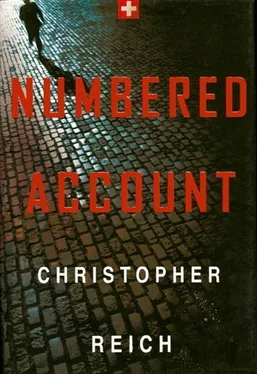Nick guarded his strict posture, determined not to appear nervous in any way. The peaks of his shoulder blades brushed the back of the chair. His elbows rested on the armrests and his hands were folded in his lap, thumbs raised to form a steeple. He examined his shoes, which were spit polished, and his trousers, which sported a razor crease. He studied his hands, which were immaculate and had been ever since the age of nine when his father had started a nightly homework review.
During the fall of Nick’s fifth-grade year, it became his father’s practice to meet with him every evening at six o’clock in the dining room to review his schoolwork. Nick would put on a fresh shirt and using a fingernail brush his father had given him, wash his hands and nails assiduously. Before presenting his homework for review, he’d show his father his hands—palm up, palm down—while answering the usual questions about how school had been that day. He could still remember the feel of his dad’s hands, so large and soft and strong, taking his own little ones into them, turning them over, checking for dirty nails. When the inspection was finished, they’d shake hands, interlocking their little fingers. It was their secret handshake. Then they would begin work. This went on for a year and a half, and during that time Nick convinced himself he hated it.
The first Monday after his father was killed, Nick came down to the dining room table exactly at six o’clock. He had done all his homework, then put on a clean shirt and washed his hands, using his dad’s fingernail brush. He waited at the table for an hour. He could hear his mother watching TV in the den, getting up every fifteen minutes to make herself a drink. He came down every evening for the rest of that week. Each night he hoped that she would take his father’s place. Each night he prayed that things would be like they’d been before.
But his mother never came to the table. After a week, Nick didn’t either.
Martin Maeder lifted his head from the documents. He cleared his throat, then leaned across the desk and drew a cigarette from a sterling silver mug. “So, Mr. Neumann,” he said in flawless English, “is Switzerland agreeing with you?”
“More or less,” Nick answered, trying hard to match Maeder’s easygoing tone. “The work more, the weather less.”
Maeder picked up a cylindrical lighter with both hands and lit his cigarette. “Let me rephrase that. Since you arrived, would you say your glass has been half-filled or half-emptied?”
“Maybe you should ask me that question after this meeting.”
“Maybe.” Maeder laughed and took a long drag. “You a tough guy, Neumann? You know, Sergeant Rock, the howling commandos, the whole nine yards. Oh yeah, I lived in the States. Little Rock, 1958 to 1962. The height of the cold war. We had to practice taking cover under our desks. You know the drill.” He clenched his cigarette between his front teeth and clasped his hands behind his head. “Put your head between your knees and kiss your ass good-bye.” He removed the cigarette, exhaled a thin stream of smoke, and continued smiling. “You’re an army man, you should know.”
Nick didn’t answer right away. He gazed at Maeder. His hair was slicked back off the forehead in a viscous wave. His complexion was chalky. Bifocals perched at the end of a suspicious nose partially hid his dark eyes while his mouth remained twisted in a kind of perpetual grin. Nick recognized that it was the grin that betrayed the solid jaw and the scholarly spectacles, the grin that gave him the irrevocable impression that Maeder was a trickster. A well-groomed one, to be sure; but a con, all the same.
“Marines,” said Nick. “Rock was army. We were more the Alvin York type.”
“Well, Nick, army, marines, Boy Scouts, whatever. We have one pissed-off client who doesn’t give a fuck if you’re the emperor Ming. Get my drift? Just what the hell did you think you were doing?”
Nick asked himself the same question. Any certainty that his actions on behalf of the Pasha would be appreciated had evaporated at 6:15 that morning, when Maeder woke him with an invitation to an informal meeting at 9:30 A.M. Since the summons, Nick’s mind had been racing.
How could anyone have learned so quickly of his failure to transfer the Pasha’s money? None of the European banks to which he should have wired the funds could confirm their arrival or absence until this morning at ten the earliest. While the forty-seven million dollars should have exited USB’s accounts last night, the banks to which the funds were wired wouldn’t officially credit the money to their client’s account until sometime this morning, the overnight float being theirs to enjoy. As two hours were required for the bank to catalogue the past day’s transfers, no confirmation of Nick’s wire transfer could be given to even the most inquisitive client before 10:00.
But that applied only to Europe. The Far East was seven hours ahead of Zurich, and Nick recalled that matrix six included two banks in Singapore and one in Hong Kong. If he gave them until twelve P.M. local time to credit the funds to the Pasha’s account, the Pasha could only have discovered their absence at five A.M. Swiss time. One hour prior to Maeder’s call.
Confronted with Maeder’s Cheshire grin, he suddenly felt very naive.
“Tell me, Mr. Neumann,” asked Maeder, “what is the overnight carry on forty-seven million dollars?”
Nick took a deep breath and glanced at the ceiling. This kind of quick figuring was his specialty, so he decided to give Maeder a little show. “For the client, two thousand five hundred seventy-five dollars. That’s at yesterday’s rate of two and one half percent. But the bank would credit the money to its overnight money market fund and earn approximately five and one half percent or seven thousand and, um, eighty-two dollars. That would give the bank a positive carry of around forty-five hundred dollars.”
Maeder banged at his calculator like a nearsighted typist. Robbed of his thunder, he slid it across the desk and changed tack. “Unfortunately, our client is not concerned about several thousand dollars of accrued interest we failed to credit his account when we added his assets to our overnight float. What concerns our client is your failure to honor his transfer instructions. What concerns our client is the fact that sixteen hours after he gave you, and I quote, ‘bank reference, NXM,’ an order to wire transfer, sorry, to urgently wire transfer, his assets elsewhere, his money is still in Switzerland. Care to explain that?”
Nick unbuttoned his jacket and sat a little easier in his chair, pleased that he was to be given an opportunity to defend his actions. “I filled out a funds transfer form, as usual, but I specified the transaction time as today at three-thirty. I sent the form to payments traffic by internal mail. If the Friday logjam is as bad as usual, the funds should be transferred sometime Monday morning.”
“Is that right? Do you know who this client is?”
“No, sir. The account was opened by International Fiduciary Trust of Zug in 1985, prior to the current Form B regulations, which demand proof of an account holder’s identity. Of course, we treat all clients with the same respect, whether we know their names or not. They’re all equally important.”
“Though some more than others, eh?” Maeder suggested, sotto voce.
Nick shrugged. “Naturally.”
“I’ve been given to understand that yesterday was particularly calm in your neck of the woods. No one around to consult with. Sprecher ill, Cerruti out of commission.”
“Yes, it was very calm.”
“Tell me, Nick, if one of your superiors had been with you, would you have consulted him? Better yet, if this Pasha fellow, if he were your own client—say you were Cerruti—would you have acted in a similar manner? I mean given the extraordinary circumstances and all.” Maeder held up a sheet of paper and gave it a shake: the Internal Account Surveillance sheet.
Читать дальше












